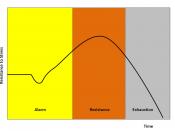Occupational stress in the 1990s-2000's is an important issue. In our society, work underlies self-esteem and identity. In the past, workplace health concerns focused mainly on safety and physical working conditions. However, over this period complaints of occupational stress have skyrocketed. Today, it is recognized that occupational stress can affect people in all areas and at all levels of work. Occupational stress impacts people's health and lifestyles. Continuing occupational stress results in physical, emotional and psychological problems comprising of the initial reactions and serious long-term health problems. Problems associated with stress can affect a person's work experience and their personal life in general. Consequently, experts in this field have developed various coping mechanisms designed to counter occupational stress comprising of the two general categories of preventative and combative coping strategies.
A person's health and lifestyle is significantly affected by occupational stress. A formal definition of occupational stress is:
"The emotional state (or mood), which results from a discrepancy between the level of demand and the person's ability to cope" (Kroemer, 1997:212)
Stress is a state of arousal provoked by specific stressors that call on the body's physical and mental reserves, triggering biochemical, physiological and psychological changes.
(http://www.convoke.com/markjr/cjstress.html [25/2/03]). Hans Seyle was one of the first to explain the process of stress-related illnesses with his "general adaptation syndrome" (G.A.S) theory. Seyle described three stages in individual encounters of stressful situations: the alarm reaction in which the initial shock and the individual's defence mechanisms become active, resistance in which the maximum adaptation stage is reached and the return to equilibrium and the final stage is exhaustion where the adaptive mechanisms collapse.
Frequent exposure to occupational stressors can produce profound physical, emotional and psychological reactions. Excessive levels of steroid hormones and other biochemical changes may lead to some common stress reactions.


